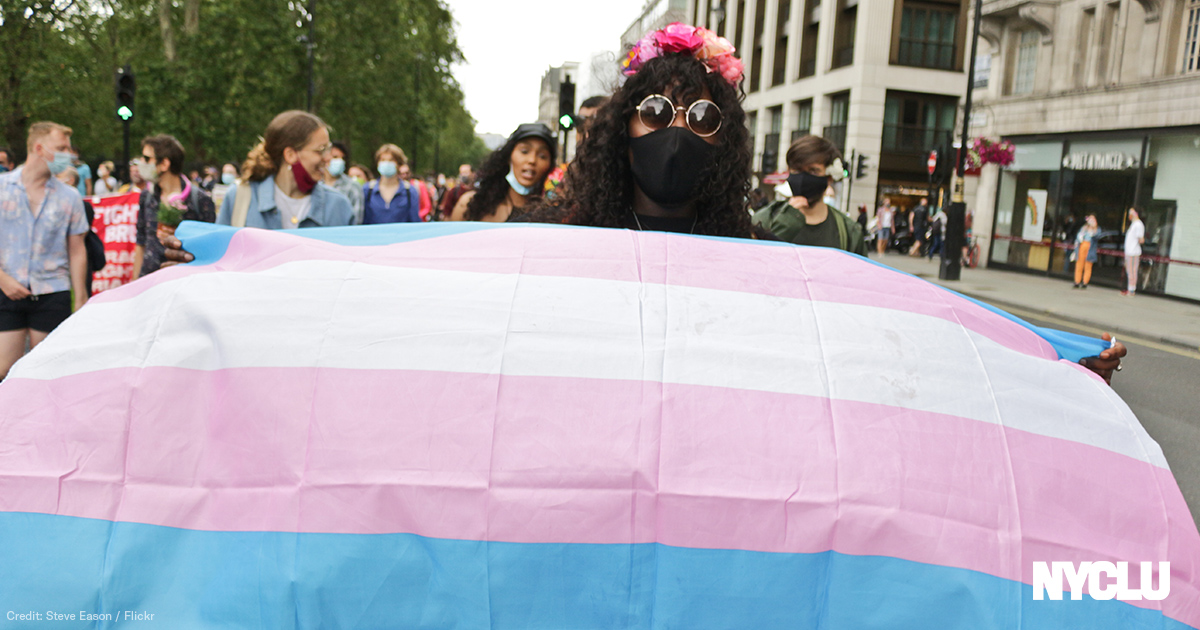Black Trans Lives Matter – Here’s How our Criminal System Fails Them

Last week, the New York City Board of Corrections announced that 17 corrections officers would be disciplined for their actions surrounding the death of 27-year-old Afro-Latinx trans woman, Layleen Polanco.
The announcement came days after the Board issued its mandated report on her death. She died of neglect in a solitary cell at Rikers Island on June 7, 2019. Guards were supposed to check on her every 15 minutes, but the report found she was left alone for 47 minutes.
In its official language and neutral tone, the report sets forth a powerful and deeply disturbing narrative about the kinds of treatment transgender, gender non-conforming, non-binary and intersex (TGNCNBI) people face in carceral settings.
It tells the story of a young woman who was caught up on outstanding “broken windows” and “vice” offenses and held in custody on just $500 bail. She suffered two seizures during her third week in custody, and her mental and physical well-being visibly and seriously deteriorated while she was behind bars.
Even so, and despite medical advice to the contrary, this young woman’s entire life story ended after she was placed in solitary confinement, in a cell by herself where she was left alone for three times as long as procedures provided for.
It is worth remembering that involvement in carceral systems is dehumanizing for any of us. Going to jail means being stripped naked; stripped of our belongings, comforts, and familiarities; kept away from our homes and loved ones; forced into close quarters with strangers; and suffering escalating indignities.
TGNCNBI New Yorkers deserve not only to survive, but to live.
But for TGNCNBI people, especially those who are Black, Indigenous, and other people of color, it is an experience especially likely to result in harassment, degradation, and violence.
One in six people who identify as transgender report having been incarcerated at some point in their lives – and this figure jumps to nearly three in six for Black transgender women.
Black and Latinx TGNCNBI New Yorkers often survive at the intersection of many socioeconomic burdens, including experiences of poverty. They disproportionately face food, shelter, and employment insecurity, race-based and gender-based discrimination, and immigration status issues. They are also notoriously over-policed and over-criminalized, and thus disproportionately likely to end up incarcerated.
During processing and while in custody, people whose gender expression does not conform to their sex assigned at birth are frequently misgendered and referred to in demeaning ways by correctional officers, either carelessly or intentionally.
In a 2017 survey of transgender and non-binary people incarcerated in New York State, 95 percent of respondents said correctional staff used derogatory names to refer to them.
Some people are placed in facilities that do not match their gender identity or otherwise put their safety at risk, despite federal laws designed to prevent this. Improper housing regularly leads to violence, and when TGNCNBI people are attacked by others in jail, they are often put in solitary confinement.
These victims of violence are sometimes forced to spend the duration of their incarceration in the torturous conditions of extreme isolation, ostensibly for their own safety and often at their own peril – as was the case for Layleen Polanco.
With the coronavirus still plaguing carceral institutions across the state, TGNCNBI people in jails and prisons are more likely to suffer because of co-existing medical concerns, to be subjected to the worst results from the decline in correctional staffing, and to face the physical attacks that can result from increased tension and decreased supervision.
As the coronavirus spreads through the correctional system, the NYCLU and others have called for immediate compassionate release of vulnerable populations, including gender-expansive New Yorkers, as thin correctional staffing and other current factors leave them susceptible to increased violence and diminished access to medical care.
This historic moment calls on us to fight even harder against racial injustices that have been kept in place despite tireless work by directly impacted communities. And as Pride month comes to a close, it’s critical that we open our eyes and hearts to support, embrace, and fight for the New Yorkers who are most targeted by various forms of oppression.
As soon as possible, New York must pass legislation to ensure that Black and Brown women and femmes are not subject to police profiling and that local and state correctional facilities prevent discrimination, harassment, and dangerous housing conditions for TGNCNBI people.
And Gov. Cuomo and state and local corrections agencies should review the situation of every TGNCNBI New Yorker who is incarcerated. If they are in state custody, state officials must consider whether their circumstances merit immediate early release to community supervision or to the care of their loved ones. If they are in jail, local officials must consider whether anyone benefits from their continued detention, and if so, whether that benefit outweighs their right to survive.
These are only first steps. Going forward, we must end our reliance on dehumanizing carceral institutions and instead use our resources to build a system that recognizes why people offend and offers holistic solutions.
And we must continue to advocate for divestment from our carceral system, which is inherently inhumane. Because TGNCNBI New Yorkers deserve not only to survive, but to live.
Their lives matter.
